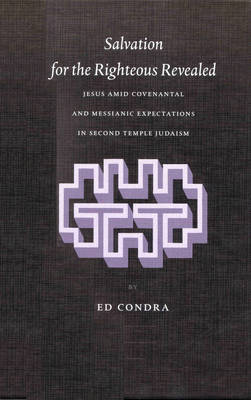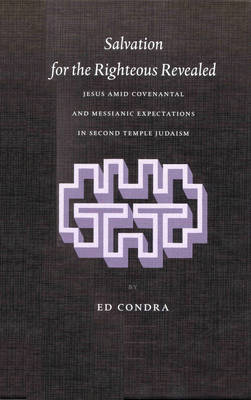
- Afhalen na 1 uur in een winkel met voorraad
- Gratis thuislevering in België vanaf € 30
- Ruim aanbod met 7 miljoen producten
- Afhalen na 1 uur in een winkel met voorraad
- Gratis thuislevering in België vanaf € 30
- Ruim aanbod met 7 miljoen producten
Zoeken
Salvation for the Righteous Revealed
Jesus Amid Covenantal and Messianic Expectations in Second Temple Judaism
Ed Condra
€ 332,95
+ 665 punten
Omschrijving
Why is there such an ethical emphasis in Jesus' gospel proclamation? This work finds the answer in Jesus meeting his audience within their own conceptual realms and then expanding those realms to point to the nature of his salvation.
The bulk of this work investigates the soteriology of Second Temple Judaism, especially of the Qumran Scrolls. The apocalyptic lesson was the demand of a greater covenantal obedience, held in tension with God's grace, a demand met through sectarian revelation and involving a somewhat diverse messianism. Within these conceptions, Jesus affirms that salvation is indeed for the "righteous," but as defined through himself as the unique Messiah.
This work is particularly useful regarding the Jesus--Paul debate, for it provides a diachronic solution grounded in the cultural-historical milieu of the times.
The bulk of this work investigates the soteriology of Second Temple Judaism, especially of the Qumran Scrolls. The apocalyptic lesson was the demand of a greater covenantal obedience, held in tension with God's grace, a demand met through sectarian revelation and involving a somewhat diverse messianism. Within these conceptions, Jesus affirms that salvation is indeed for the "righteous," but as defined through himself as the unique Messiah.
This work is particularly useful regarding the Jesus--Paul debate, for it provides a diachronic solution grounded in the cultural-historical milieu of the times.
Specificaties
Betrokkenen
- Auteur(s):
- Uitgeverij:
Inhoud
- Aantal bladzijden:
- 396
- Taal:
- Engels
- Reeks:
- Reeksnummer:
- nr. 51
Eigenschappen
- Productcode (EAN):
- 9789004126176
- Verschijningsdatum:
- 22/08/2002
- Uitvoering:
- Hardcover
- Formaat:
- Genaaid
- Afmetingen:
- 167 mm x 245 mm
- Gewicht:
- 866 g

Alleen bij Standaard Boekhandel
+ 665 punten op je klantenkaart van Standaard Boekhandel
Beoordelingen
We publiceren alleen reviews die voldoen aan de voorwaarden voor reviews. Bekijk onze voorwaarden voor reviews.








